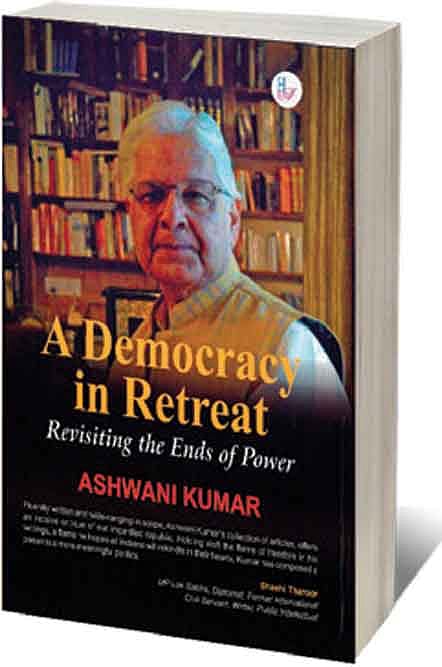A Doctrine of Dignity

DIGNITY IS AN ideal that is close to Ashwani Kumar’s heart. When the former law minister and Congress parliamentarian resigned from the Congress party last year after a four-decades-long association, he said in a letter to Sonia Gandhi, “…I have concluded that in the present circumstances and consistent with my dignity, I can best subserve a larger national cause outside the party fold.”
His latest book titled A Democracy in Retreat: Revisiting the End of Power, which he describes as a sequel to his 2020 work, Human Dignity: A Purpose In Perpetuity, is a collection of articles published in multiple newspapers, between the lockdown and until mid-2023. This book is not merely a confirmation of Kumar’s scholarship and command of India’s legal framework, but it is also an impassioned appeal, in its totality, for fighting to uphold human dignity and the rule of law. He analyses recent verdicts, invokes poetry and philosophy, dissects political developments, and delves into socio-political trends to come up with stimulating arguments.
Kumar, who was one of the youngest Additional Solicitor Generals of India at age 37, is worried, as he states in an essay, about the “recurring reports about constitutional transgressions”. He is upset that “the nauseating puerilities of the people’s representatives have denuded Parliament of its institutional sanctity”. He regrets the huge “democratic deficit” of the day as well as the “quality of the political discourse” at present, citing examples of events that pain him.
Contrary to the stand taken by a good chunk of constitutional experts who view affirmative action as a means to solely uplift classes that had been left out of power, thanks to social injustices, Kumar lauds the decision of the courts to extend the sweep of reservations to the economically weaker sections of the so-called upper castes. In short, his views in this work are not in favour of any political dispensation or against any other. “The defining logic of the majority view (in the Janhit Abhiyan verdict of November 2022), also accepted in principle by the minority, is that the debasing impact of poverty on human dignity is caste neutral,” writes Kumar, who besides being a former Congress national spokesperson is also a noted Supreme Court lawyer.
It's the Pits!
13 Feb 2026 - Vol 04 | Issue 58
The state of Indian cities
Kumar calls for the Opposition to rise to the occasion and not vegetate. His disapproval of their ways is sharp in a few of his essays. In the article titled ‘India@75: Promises to Keep’, Kumar states, “The Opposition, with its crucial role in national politics and charged with the duty to call the government to account for its acts of omission and commission, must reflect upon its own inadequacies. Given to compulsive grandstanding, unable to present a coherent political strategy, mired in an elusive search for a unifying leader and an overarching national sentiment that can bind the nation, it seems unable to offer a refreshing narrative of national reconstruction.”
Writing about Vladimir Putin’s invasion of Ukraine, Kumar supports the West for excluding Russia from the SWIFT financial system. Although the writeup appeared originally within days of Moscow launching its “special” operations and though Putin has since been able to offset major damages to the Russian economy, Kumar’s warnings about the violation of international laws and the typical hubris of empires are spot on: “He (Putin) should know that just as Iraq and Afghanistan have irretrievably diminished America’s credibility as the superpower arbitrator of global peace, the perception of Putin as an aggressor in Ukraine has dented his standing, both in the chanceries of the world and in the collective consciousness of the people as a whole.”
Kumar covers a raft of issues in this book: from Punjab to the Modi government to Parliament to custodial torture and farmers’ protests to police excesses. He has a word of caution for not just the Opposition but for the Supreme Court of India, too. He berates the highest court in the column titled ‘Rescuing a Democracy in Retreat’ over its responses in cases such as the Bhima Koregaon arrests, denying bail for Father Stan Swamy, and so on.
Whether you agree with him or not, Kumar’s opinions are remarkably well presented and argued. He raises his voice for all those who deserve justice and dignity of life. His scholarship is the icing on the cake.

